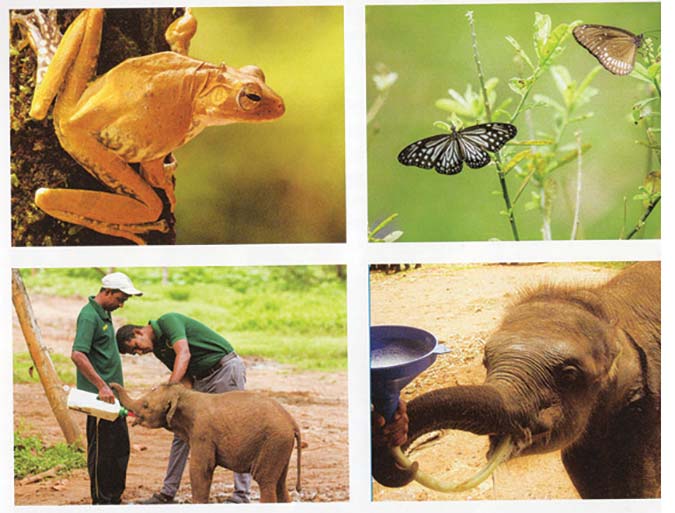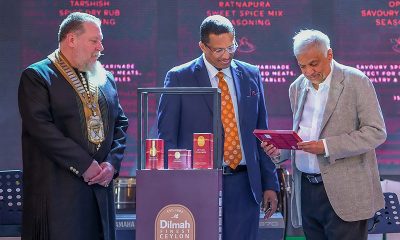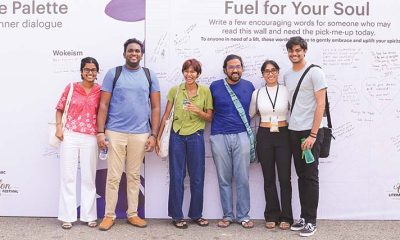Features
Dilmah Conservation – an effort to combat “an inconvenient truth”

(Excerpted from the Merrill. J. Fernando autobiography)
“There should be no greater priority than ensuring that the quality of the air we breathe, the rainfall that provides our sustenance, and the host of ecosystems that make human life possible are protected for our children and their generations.”
The bounty of nature is a gift from God that mankind, for centuries, has taken for granted and quite often abused. The evidence of such destruction is seen all over the world – in polluted beaches, dirty waterways, denuded forests, and the regular killing of wild animals, even those which are endangered and protected by law. Mankind’s refusal or inability to live in harmony with nature has resulted in damage to the environment which cannot be repaired…
A wake-up call
Like most people, I have been aware of environmental damage in a general way without having any idea of the real extent of the damage. But, one day, an in-flight movie titled ‘An Inconvenient Truth,’ in which a former Vice President of the USA, Al Gore, featured, the only film I have ever watched to the end during a flight, completely changed my perceptions of the subject.
Normally on a flight, half an hour into a movie I fall asleep. However, this film, though a documentary, compiled specifically to raise public awareness about global warming, engaged my total attention to the very end. In very simple terms Al Gore explained the damage we have collectively, inflicted on the planet and are continuing to do so by unregulated activities which create excessive carbon emission. He spoke passionately and convincingly of what he termed a “planetary emergency” and the inevitability of catastrophic consequences.
Having watched the movie, I realized that unless we all wake up and work on remedial measures, the worst case scenario of Gore’s prediction would eventually become a reality. However, no meaningful results can be achieved unless all the inhabitants of the planet, the nations, the governments, and public and private enterprise acknowledge the danger. Responsible entrepreneurs can no longer ignore the imperative of the symbiosis that must exist between enterprise, and environment. The latter is no longer an externality.
As in every other sphere of social responsibility, the rehabilitation and preventive programs set in place by governments must be supported by private business and individual initiatives. Unless each one of us assumes personal responsibility for preservation and restoration, there will be no meaningful impact. But does the private sector help the environment? Perhaps now there is activism, driven by peer pressure and the stark reality of environmental degradation confronting societies all over the world.
However, the truth is that historically, the private sector record globally in regard to environmental protection has been miserable. The global private sector, by and large, has always been exploitative of the environment and continues to be so.
Historical consequences
The main business of Dilmah is Ceylon Tea and I owe my success to the quality of that tea. Therefore, my enterprise has an enduring connection to tea and the land on which it is grown. Most of that land in our country, till the first quarter of the 19th century, was covered by both highland and lowland forest. According to environmental analysts, since 1830, Sri Lanka’s forest cover has declined from 80% of total land area, to around 20% today.
A significant proportion of this denudation, especially in the highlands, can be attributed to British entrepreneurs who were offered attractive inducements, by the then colonial Government of Ceylon, to grow coffee, tea, and rubber, for consumption in Western markets mainly. In an earlier chapter I have referred to this exploitative aspect of our colonial past.
Tea is the healthiest drink next to water but, in our country, and probably in most other countries where it is grown, it is a legacy of colonial exploitation of the natural resources of a conquered land. That historical association is unalterable but, as responsible entrepreneurs, we can do much to mitigate the undesirable consequences of that history. We cannot recreate the past, but we can palliate history by reversing some of its adverse consequences. That is where active environmental conservation in plantation areas comes in.
One can no longer talk about conservation without the subject of ‘climate change’ entering the discussion. Farmers and growers the world over are the worst hit by environmental damage and climate change. But the sad reality is that it is the farmers themselves, especially those involved in mono-crops, who contribute to such damage in various ways, often unwittingly, through lack of awareness of both environmental damage and climate change and also due to the lack of resources to make a difference.
The educated and empowered farmer can design his cultivation activities in such a manner that he will, whilst earning his livelihood from the land, also make a positive contribution to its protection. But he needs to first get a decent price for his product. Unless a surplus is created in the country of the grower and some of that finds its way back into his hands, the grower cannot contribute to the preservation of the environment that sustains his enterprise.
Exploitation and impact on environment
Having commented on the farmers’ contribution to environmental damage, let me voice my thoughts on the historical injustice of the farmers’ present predicament. I have commented on this issue elsewhere in this writing, but reiteration is relevant in the present context.
There was a period, many decades ago, when small- or medium sized companies controlled the export of many commodities from the growing countries. Farmers got a reasonable price for produce, plantation owners made decent profits, and the consumer bought quality product at a fair price. It was a well-managed supply chain. Then came the big multinationals, which acquired the small companies through attractive offers, or by forcing capitulation through undercutting of prices and discounting strategies.
‘What followed was the commodification of a decent product, through the debasement of quality and the lowering of selling price. The result was the enrichment of the middle man, the multinational brand owner, and the supermarket chain, at the expense of the farmer-producer. The depression in buying price meant the decline of the latter. How can the plantation owner or the individual farmer contribute to the preservation of the environment, when he is unable to get a decent price for his produce?
The exploitation of the grower and producer at the hands of multinational brand owners comes in a variety of forms. One of the commonest, and most effective, is the threat of removal of patronage, unless the producer agrees to the relentless selling price reduction demanded by the multinational. The sword that the multinational holds over the growers’ head is the warning, that unless the price is lowered, it will take the business elsewhere and source the product from a different country, which is prepared to compromise its responsibility to sustainable enterprise for the sake of capturing the business.
In my 70-year journey in tea, I have seen many such examples of this insidious business strategy all over the world and also been a victim of it myself. The creation of Dilmah, a brand which brings the profits back to the country of origin, was my response to that strategy.
Meaningful contribution
It is my firm conviction that enterprises linked to land-based operations are best placed to make significant contributions to the preservation of the ecosystem, to repair damage, and to educate all concerned on the importance of such actions. I have said this before and I will say it again: we cannot expect governments alone to achieve social and environmental rehabilitation and protection goals. Private enterprise has to take a lead and, by role model example, inspire the individual citizen to do his bit. We must all assume responsibility before it is imposed upon us.
It is for this reason that I decided that conservation should be a major component of my Charitable Foundation. Until about 2006 the main agenda of my Charitable Foundation was social justice; contributing to the correction of inequalities and inequities in our society. However, in various direct and indirect ways, the Foundation’s social justice remediation initiatives positively influenced environmental issues.
In marginalized communities, especially in rural areas with inadequate infrastructure, lives of people are directly connected to the immediate environment. In such spaces, poverty reduction and environmental care are concomitant. Applied across a global front, environmental conservation and the future of the human race are inclusive considerations; one is not possible without the other.
Dilmah had already been involved in a major Conservation Symposium when, in 2003, we sponsored the World Conservation Union’s Asia Regional Conservation Forum held in Colombo, in December that year. This convocation brought together representatives from governments, non-governmental organizations, research foundations, donors, independent researchers, and scientists from over 23 countries. It was an early demonstration of our commitment to conservation.
Birth of Dilmah Conservation
In 2007, Dilmah Conservation was inaugurated – perhaps a year after I watched Al Gore’s movie – and its mission defined as a key business objective of my group of companies. Its primary aim was to protect the environment by fostering harmony between man, his activities, and nature. Since its commencement, many of the conservation initiatives have been supported by the International Union for Conservation of Nature (IUCN), the global authority for conservation, providing technical and research support to environment management and rehabilitation initiatives worldwide.
Since its formal inception, Dilmah Conservation has been involved in a multitude of remedial and pioneering initiatives, both large and small, across the length and breadth of the island. The focus, of course, has been in rural farming communities and the plantation areas.
Features
US foreign policy-making enters critical phase as fascist threat heightens globally

 It could be quite premature to claim that the US has closed ranks completely with the world’s foremost fascist states: Russia, China and North Korea. But there is no denying that the US is breaking with tradition and perceiving commonality of policy orientation with the mentioned authoritarian states of the East rather than with Europe and its major democracies at present.
It could be quite premature to claim that the US has closed ranks completely with the world’s foremost fascist states: Russia, China and North Korea. But there is no denying that the US is breaking with tradition and perceiving commonality of policy orientation with the mentioned authoritarian states of the East rather than with Europe and its major democracies at present.
Increasingly, it is seemingly becoming evident that the common characterization of the US as the ‘world’s mightiest democracy’, could be a gross misnomer. Moreover, the simple fact that the US is refraining from naming Russia as the aggressor in the Russia-Ukraine conflict and its refusal to perceive Ukraine’s sovereignty as having been violated by Russia, proves that US foreign policy is undergoing a substantive overhaul, as it were. In fact, one could not be faulted, given this backdrop, for seeing the US under President Donald Trump as compromising its democratic credentials very substantially.
Yet, it could be far too early to state that in the traditional East-West polarity in world politics, that the US is now squarely and conclusively with the Eastern camp that comprises in the main, China and Russia. At present, the US is adopting an arguably more nuanced approach to foreign policy formulation and the most recent UN Security Council resolution on Ukraine bears this out to a degree. For instance, the UN resolution in question reportedly ‘calls for a rapid end to the war without naming Russia as the aggressor.’
That is, the onus is being placed on only Ukraine to facilitate an end to the war, whereas Russia too has an obligation to do likewise. But it is plain that the US is reflecting an eagerness in such pronouncements to see an end to the Ukraine conflict. It is clearly not for a prolongation of the wasting war. It could be argued that a negotiated settlement is being given a try, despite current international polarizations.
However, the US could act constructively in the crisis by urging Russia as well to ensure an end to the conflict, now that there is some seemingly friendly rapport between Trump and Putin.
However, more fundamentally, if the US does not see Ukraine’s sovereignty as having been violated by Russia as a result of the latter’s invasion, we are having a situation wherein the fundamental tenets of International Law are going unrecognized by the US. That is, international disorder and lawlessness are being winked at by the US.
It follows that, right now, the US is in cahoots with those powers that are acting autocratically and arbitrarily in international politics rather than with the most democratically vibrant states of the West, although a facile lumping together of the US, Russia and China, is yet not possible.
It is primarily up to the US voting public to take clear cognizance of these developments, draw the necessary inferences and to act on them. Right now, nothing substantive could be done by the US voter to put things right, so to speak, since mid-term US elections are due only next year. But there is ample time for the voting public to put the correct perspective on these fast-breaking developments, internationally and domestically, and to put their vote to good use in upcoming polls and such like democratic exercises. They would be acting in the interest of democracy worldwide by doing so.
More specifically it is up to Donald Trump’s Republican voter base to see the damage that is being done by the present administration to the US’ standing as the ‘world’s mightiest democracy’. They need to bring pressure on Trump and his ‘inner cabinet’ to change course and restore the reputation of their country as the foremost democracy. In the absence of such action it is the US citizenry that would face the consequences of Trump’s policy indiscretions.
Meanwhile, the political Opposition in the US too needs to get its act together, so to speak, and pressure the Trump administration into doing what is needed to get the US back to the relevant policy track. Needless to say, the Democratic Party would need to lead from the front in these efforts.
While, in the foreign policy field the US under President Trump could be said to be acting with a degree of ambivalence and ambiguity currently, in the area of domestic policy it is making it all to plain that it intends to traverse a fascistic course. As has been proved over the past two months, white supremacy is being made the cardinal principle of domestic governance.
Trump has made it clear, for example, that his administration would be close to ethnic chauvinists, such as the controversial Ku Klux Klan, and religious extremists. By unceremoniously rolling back the ‘diversity programs’ that have hitherto helped define the political culture of the US, the Trump administration is making no bones of the fact that ethnic reconciliation would not be among the government’s priorities. The steady undermining of USAID and its main programs worldwide is sufficient proof of this. Thus the basis has been adequately established for the flourishing of fascism and authoritarianism.
Yet, the US currently reflects a complex awareness of foreign policy questions despite having the international community wondering whether it is sealing a permanent alliance with the main powers of the East. For instance, President Trump is currently in conversation on matters in the external relations sphere that are proving vital with the West’s principal leaders. For example, he has spoken to President Emmanuel Macron of France and is due to meet Prime Minister Keir Starmer of the UK.
Obviously, the US is aware that it cannot ‘go it alone’ in resolving currently outstanding issues in external relations, such as the Ukraine question. There is a clear recognition that the latter and many more issues require a collaborative approach.
Besides, the Trump administration realizes that it cannot pose as a ‘first among equals’, given the complexities at ground level. It sees that given the collective strength of the rest of the West that a joint approach to problem solving cannot be avoided. This is particularly so in the case of Ukraine.
The most major powers of the West are no ‘pushovers’ and Germany, under a possibly Christian Democratic Union-led alliance in the future, has indicated as much. It has already implied that it would not be playing second fiddle to the US. Accordingly, the US is likely to steer clear of simplistic thinking in the formulation of foreign policy, going forward.
Features
Clean Sri Lanka – hiccups and remedies
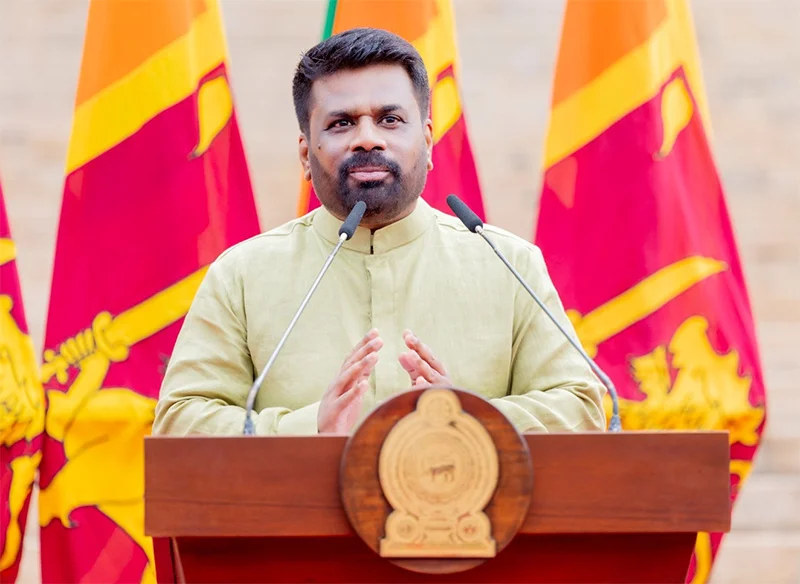
by Upali Gamakumara,
Upali.gamakumara@gmail.com
The Clean Sri Lanka (CSL) is a project for the true renaissance the NPP government launched, the success of which would gain world recognition. It is about more than just cleaning up places. Its broader objectives are to make places attractive and happy for people who visit or use services in the country, focusing more on the services in public institutions and organisations like the SLTB. Unfortunately, these broader objectives are not apparent in its theme, “Clean Sri Lanka,” and therefore there is a misconception that keeping the environment clean is the main focus.
People who realise the said broader objectives are excited about a cleaner Sri Lanka, hoping the President and the government will tackle this, the way they are planning to solve other big problems like the economy and poverty. However, they do not see themselves as part of the solution.
From the management perspective, the CSL has a strategic plan that is not declared in that manner. When looking at the government policies, one can perceive its presence, the vision being “A Prosperous Nation and a Beautiful Life,” the mission “Clean Sri Lanka” and the broader objectives “a disciplined society, effective services, and a cleaner environment.” If the government published these as the strategy, there would have been a better understanding.
Retaining the spirit and expectations and continuing the ‘Clean Sri Lanka’ project is equally important as much as understanding its deep idea. For this, it needs to motivate people, which differs from those motivators that people push to achieve selfish targets. The motivation we need here is to evolve something involuntarily, known as Drivers. Drivers push for the survival of the evolution or development of any entity. We see the absence of apparent Drivers in the CSL project as a weakness that leads to sporadic hiccups and free flow.
Drivers of Evolution
Drivers vary according to the nature of envisaged evolution for progress. However, we suggest that ‘the force that pushes anything to evolve’ would fit all evolutions. Some examples are: ‘Fitting to survival’ was the driver of the evolution of life. Magnetism is a driver for the unprecedented development of physics – young Einstein was driven to enquire about the ‘attraction’ of magnets, eventually making him the greatest scientist of the 20th century.
Leadership is a Driver. It is essential but do not push an evolution continually as they are not sprung within a system involuntarily. This is one of the reasons why CSL has lost the vigour it had at its inception.
CSL is a teamwork. It needs ‘Drives’ for cohesion and to push forward continually, like the Quality Improvement Project of the National Health Service (NHS) in England. Their drivers are outlined differently keeping Aims as their top driver and saying: Aims should be specific and measurable, not merely to “improve” or “reduce,” engage stakeholders to define the aim of the improvement project and a clear aim to identify outcome measures.
So, we think that CSL needs Aims as defined by NHS, built by stakeholder participation to help refine the project for continuous evolution. This approach is similar to Deming’s Cycle for continual improvement. Further, two more important drivers are needed for the CSL project. That is Attitudinal Change and Punishment. We shall discuss these in detail under Psychoactive Environment (pSE) below.
Aside from the above, Competition is another driver in the business world. This helps achieve CSL objectives in the private sector. We can see how this Driver pushes, with the spread of the Supermarket chains, the evolution of small and medium retail shops to supermarket level, and in the private banks and hospitals, achieving broader objectives of CSL; a cleaner environment, disciplined behaviuor, efficient service, and the instillation of ethics.
The readers can now understand the importance of Drivers pushing any project.
Three Types of Entities and Their Drives
We understand, that to do the transformation that CSL expects, we need to identify or adopt the drivers separately to suit the three types of entities we have in the country.
Type I entities are the independent entities that struggle for their existence and force them to adopt drivers involuntarily. They are private sector entities, and their drivers are the commitment of leadership and competition. These drivers spring up involuntarily within the entity.
Type II are the dependent entities. To spring up drivers of these entities commitment of an appointed trustee is a must. Mostly in state-owned entities, categorized as Boards, Authorities, Cooperations, and the like. Their drivers do not spring up within or involuntarily unless the leader initiates. The Government of a country also falls into this type and the emergence of drivers depends on the leader.
Type III entities have neither independent nor dependent immediate leader or trustee. They are mostly the so-called ‘Public’ places like public-toilets, public-playgrounds, and public-beaches. No team can be formed as these places are open to any, like no-man-land. Achieving CSL objectives at these entities depends on the discipline of the public or the users.
Clean Sri Lanka suffers the absence of drivers in the second and third types of entities, as the appointed persons are not trustees but temporary custodians.
The writer proposes a remedy to the last two types of entities based on the theory of pSE explained below.
Psychoactive Environment (pSE) –
The Power of Customer Attraction
Research by the writer introduced the Psychoactive Environment (pSE) concept to explain why some businesses attract more customers than others who provide the same service. Presented at the 5th Global Conference on Business and Economics at Cambridge University in 2006, the study revealed that a “vibe” influences customer attraction. This vibe, termed pSE, depends on Three Distinct Elements, which can either attract or repel customers. A positive pSE makes a business more attractive and welcoming. This concept can help develop Drivers for Type II and III entities.
pSE is not an all-inclusive solution for CSL, but it lays the foundation for building Drivers and motivating entities to keep entrants attractive and contented.
The structure of the pSE
The three distinct Elements are the Occupants, Systems, and Environment responsible for making a pSE attractive to any entity, be it a person, institution, organization, or county. Each of these elements bears three qualities named Captivators. These captivators are, in simple terms, Intelligent, Nice, and Active in their adjective forms.
pSE theorizes that if any element fails to captivate the entrant’s mood by not being Intelligent, Nice, or Active, the pSE becomes negative, repelling the entrant (customer). Conversely, the positive pSE attracts the entrants if the elements are Intelligent, Nice, and Active.
For example, think person who comes to a Government Office for some service. He sees that the employees, service, and environment are intelligent, nice, and active, and he will be delighted and contented. He will not get frustrated or have any deterioration in national productivity.
The Significance of pSE in CSL
The Elements and the Captivators are universal for any entity. Any entity can easily find its path to Evolution or Progress determined by these elements and captivators. The intangible broader objectives can be downsised to manageable targets by pSE. Achievements of these targets make the entrants happy and enhance productivity – the expectation of Clean Sri Lanka (CSL).
From the perspective of pSE, now we can redefine the Clean Sri Lanka project thus:
To make the Elements of every entity in Sri Lanka: intelligent, Nice, and Active.
How Would the pSE be A Remedy for The Sporadic Hiccups?
We have seen two possible reasons for sporadic setbacks and the discontinuity of some projects launched by the CSL. They are:
The absence of involuntary Drivers for evolvement or progress
Poor attitudes and behaviors of people and leaders
Remedy for the Absence of Drivers
Setting up a system to measure customer or beneficiary satisfaction, and setting aims can build Drivers. The East London NHS principles help build the Aims that drive type II & II entities. The system must be designed to ensure continual improvement following the Deming Cycle. This strategy will create Drivers for Type I & II entities.
This process is too long to explain here therefore we refrain from detailing.
Attitudinal Change
The most difficult task is the attitudinal and behavioural change. Yet it cannot be postponed.
Punishment as a strategy
In developed countries, we see that people are much more disciplined than in the developing countries. We in developing countries, give credit to their superior culture, mitigating ours as rudimental. The long experience and looking at this affair from a vantage point, one will understand it is not the absolute truth. Their ruthless wars in the past, rules, and severe punishment are the reasons behind this discipline. For example, anyone who fails to wear a car seatbelt properly will be fined 400 AUD, nearly 80,000 LKR!
The lesson we can learn is, that in Sri Lanka, we need strong laws and strict punishment together with a type of strategic education as follows.
Psychological Approach as a Strategy
The psychological theory of attitude formation can be used successfully if some good programmes can be designed.
All attitude formations start with life experience. Formed wrong or negative attitudes can be reversed or instilled with correct attitudes by exposure to designed life experiences. The programmes have been developed using the concepts of Hoshin Kanri, Brainstorming, Cause-and-Effect analysis, and Teamwork, in addition to London NTS Quality Improvement strategies.
The experience and good responses we received for our pSE programs conducted at several institutions prove and have built confidence in our approach. However, it was a time, when governments or organisations did not pay much attention to cultural change as CSL expects in the country.
Therefore, we believe this is a golden opportunity to take the CSL supported by the pSE concept.
Features
Visually impaired but ready to do it their way
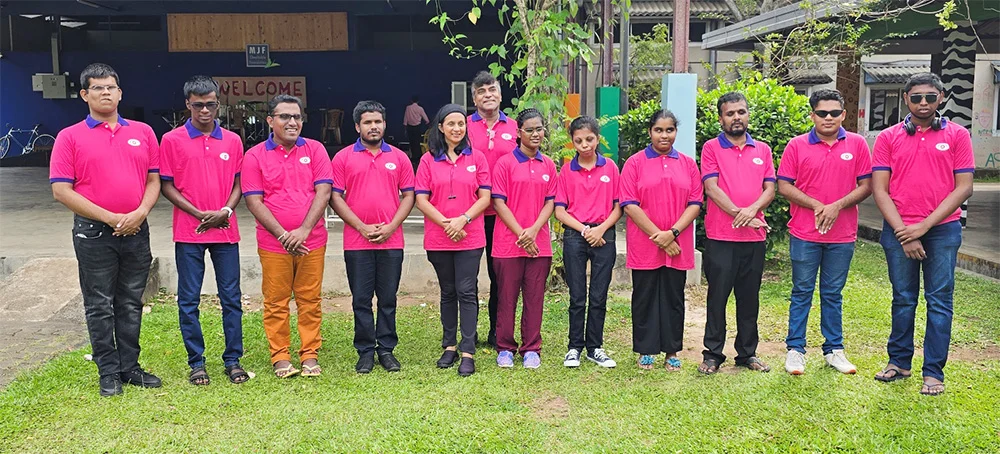
 Although they are visually impaired youngsters, under the guidance of renowned musician Melantha Perera, these talented individuals do shine bright … hence the name Bright Light.
Although they are visually impaired youngsters, under the guidance of renowned musician Melantha Perera, these talented individuals do shine bright … hence the name Bright Light.
Says Melantha: “My primary mission is to nurture their talent and ensure their sustainable growth in music, and I’m thrilled to announce that Bright Light’s first public performance is scheduled for 7th June, 2025. The venue will be the MJF Centre Auditorium in Katubadda, Moratuwa.”
Melantha went on to say that two years of teaching, online, visually impaired youngsters, from various parts of the island, wasn’t an easy ride.
There were many ups and downs but Melantha’s determination has paid off with the forming of Bright Light, and now they are gearing up to go on stage.
According to Melantha, they have come a long way in music.
“For the past few months, we have been meeting, physically, where I guide them to play as a band and now they show a very keen interest as they are getting to the depth of it. They were not exposed to English songs, but I’ve added a few English songs to widen their repertoire.
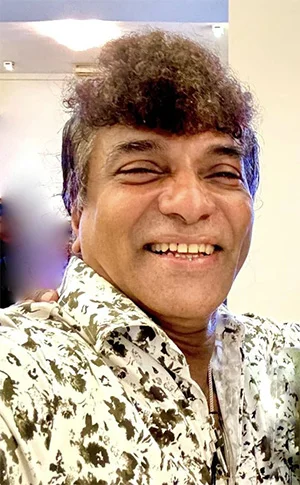
Melantha Perera: Invented a notation
system for the guitar
“On 7th June, we are opening up for the public to come and witness their talents, and I want to take this product island-wide, giving the message that we can do it, and I’m hoping to create a database so there will be a following. Initially, we would like your support by attending the show.”
Melantha says he didn’t know what he was getting into but he had confidence teaching anyone music since he has been in the scene for the past 45 years. He began teaching in 2015,
“When I opened my music school, Riversheen School of Music, the most challenging part of teaching was correcting tone deaf which is the theoretical term for those who can’t pitch a note, and also teaching students to keep timing while they sang and played.”
Melantha has even invented a notation system for the guitar which he has named ‘MelaNota’. He has received copyrights from the USA and ISO from Australia, but is yet to be recognised in Sri Lanka.
During Covid-19, Melantha showcased MelaNota online and then it was officially launched with the late Desmond De Silva playing one of his tunes, using MelaNota.
Melantha says that anyone, including the visually impaired, can play a simple melody on a guitar, within five minutes, using his notation system.
“I’ve completed the system and I’m now finalising the syllabus for the notation system.”
Melantha has written not only for the guitar, but also for drums, keyboards, and wind instruments.
For any queries, or additional information, you could contact Melantha at 071 454 4092 or via email at thebandbrightlight@gmail.com.
-

 Business4 days ago
Business4 days agoSri Lanka’s 1st Culinary Studio opened by The Hungryislander
-

 Sports5 days ago
Sports5 days agoHow Sri Lanka fumbled their Champions Trophy spot
-

 News7 days ago
News7 days agoKiller made three overseas calls while fleeing
-

 News6 days ago
News6 days agoSC notices Power Minister and several others over FR petition alleging govt. set to incur loss exceeding Rs 3bn due to irregular tender
-

 Features5 days ago
Features5 days agoThe Murder of a Journalist
-

 Sports5 days ago
Sports5 days agoMahinda earn long awaited Tier ‘A’ promotion
-
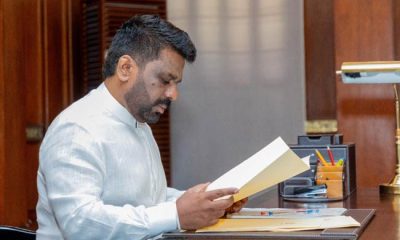
 Features5 days ago
Features5 days agoExcellent Budget by AKD, NPP Inexperience is the Government’s Enemy
-

 News6 days ago
News6 days agoMobile number portability to be introduced in June

